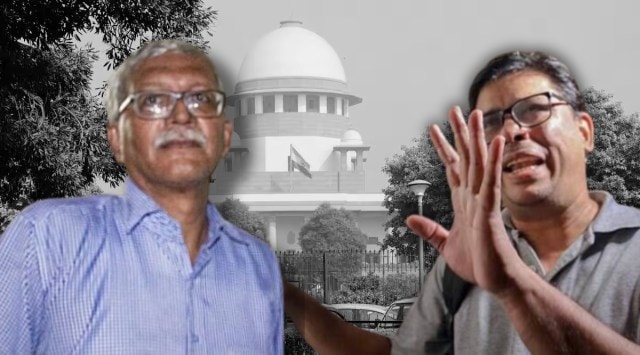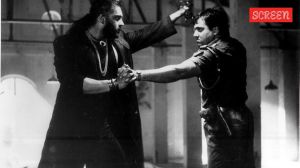Noting that they had been in jail as undertrials for almost five years, the Supreme Court granted bail Friday to Elgar Parishad case accused Vernon Gonsalves and Arun Ferreira who are facing charges under the Unlawful Activities (Prevention) Act for alleged membership of the banned CPI (Maoist) and raising funds for terror activities among others.
Setting aside two judgments of the Bombay High Court denying them bail, a bench of Justices Aniruddha Bose and Sudhanshu Dhulia said the charges against the two men were “no doubt serious” but that cannot be the only reason to deny them relief.

“Allegations against them no doubt are serious, but for that reason alone bail cannot be denied to them. While dealing with the offences under Chapters IV and VI of the 1967 Act (UAPA), we have referred to the materials available against them at this stage. These materials cannot justify continued detention of the appellants, pending final outcome of the case under the other provisions of the 1860 Code and the 1967 Act,”the bench said.
Story continues below this ad
The NIA had produced documents and letters allegedly exchanged between them as well as evidence of witnesses to establish the charges against the duo.
The bench which perused the material said “there is nothing against the appellants to prima facie establish that they had indulged in the activities which would constitute overawing any public functionary by means of criminal force or the show of criminal force or attempts by the appellants to do so. Neither there is allegation against them of causing death of any public functionary or attempt to cause death of such functionary. Mere holding of certain literatures through which violent acts may be propagated would not ipso facto attract the provisions of Section 15(1)(b) of the said Act. Thus, prima facie, in our opinion, we cannot reasonably come to a finding that any case against the appellants under Section 15(1) (b) of 1967 Act can be held to be true”.
On the charge of them being members of the CPI (Maoist), the court said “no material has been demonstrated by the NIA before us that the appellants are members of the terrorist organisation. AF’s (Arun Ferriera’s) involvement with IAPL – Indian Association of People’s Lawyer (“IAPL”) — as a frontal organisation of the Communist Party of India (Maoist) is sought to be established, and that has been referred to in the chargesheet as well. But the link between IAPL and the CPI (Maoist) has not been clearly demonstrated through any material. Reference to AF and VG (Vernon Gonsalves) as members of the CPI (Maoist) appears from the statement of protected witness, but that link is made in relation to events between the years 2002-2007, before the organisation was included in the First Schedule to the 1967 Act. No evidence of continued membership after the party was classified as a terrorist organisation has been brought to our notice”.
On the letters and other documentary material produced by the NIA, the SC said they “are in the nature of hearsay evidence, recovered from co-accused. Moreover, no covert or overt terrorist act has been attributed to the appellants in these letters, or any other material forming part of records of these two appeals. Reference to the activities of the accused are in the nature of ideological propagation and allegations of recruitment. No evidence of any of the persons who are alleged to have been recruited or have joined this “struggle” inspired by the appellants has been brought before us. Thus, we are unable to accept NIA’s contention that the appellants have committed the offence relating to support given to a terrorist organisation”.
Story continues below this ad
The bench also said that “there has been no credible evidence against the appellants of commission of any terrorist act or enter into conspiracy to do so to invoke the provisions of Section 43D (5) of the’ Act.
On allegations that they raised funds for terror activities, the bench said “we do not think at this stage, in absence of better evidence, the account statement is credible enough to justify invoking the bail-restricting clause by attracting Section 40 of the 1967 Act”.
Taking into account that Gonsalves was convicted under the UAPA earlier in a separate case, the bench said that their bail conditions to be imposed by the trial court shall state that they shall not leave Maharashtra without obtaining the trial court’s permission, surrender their passports to NIA and provide their addresses and mobile phone numbers to the Investigating Officer (IO). They will have to retain only one mobile connection each, keep their phones charged and active all the time, pair their phones with that of the Investigating Officer and report to the IO once a week.
It also allowed the prosecution to move for cancellation of bail if there is a breach of these conditions and any other which the trial court may impose.
Story continues below this ad
Maharashtra Police had arrested 16 people in connection with the violence that broke out in Bhima Koregaon near Pune, a day after the Elgar Parishad meeting held on December 31, 2017.
Some of the accused in the case besides Gonsalves and Ferriera are activists Gautam Navlakha, Sudha Bharadwaj, Varavara Rao, Anand Teltumbde, Sudhir Dhawale, Rona Wilson, Surendra Gadling, Shoma Sen and Mahesh Raut. The NIA had also made Anand Teltumbde an accused citing evidence obtained in the course of the investigation.
In December 2021, the High Court granted bail to Bharadwaj but denied relief to the other accused including Gonsalves and Ferrreira who subsequently approached the Supreme Court.
In August 2022, the top court granted bail to Rao and to Teltumbde in November 2022. Last year, it also allowed a request by Navlakha to be shifted to house arrest from the Taloja Jail for health reasons.









